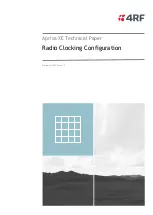
HT98R068-1 Two-way Radio OTP MCU
External Control
For different audio processing control requirements, in addition to the internal MCU
connections, external SPI control is also supported. However, before using the external
control, some relevant initialisation must be executed which includes the PLL, reset and
SPI path. After the PLL is setup and the audio processor is reset (the flow is the same
with the previous unit), set SPICR [7] (IEMC) =0 to switch the SPI path to be an external
pin-shared port so that the external SPI command can be excuted. The five occupied I/O
ports cannot be applied for other functions at this time.
SPICK
MOSI
MISO
SPISS
SPIRQ
SPICR[7]=1
SPICR[3]
SPICR[2]
SPICR[1]
SPICR[4] SPICR[0]
SPICR[7]=0
PC6 PC4 PA5 PC7 PC5
SPI Control Signal Table
Points to note when using external control
when required to reduce the PLL frequency or entering the sleep mode
when the SPI is returned to the internal MCU control
Usable pins decrease
When 1 or 2 problems of those described above occurs, it’s recommended that use
master slave control signal in the SPI external control unit and internal MCU or establish
a control protocol, for the objective of internal register control for frequency adjustment or
audio processor control.This will reduce the loading on the master MCU (external MCU)
for calculations and flow control. See the following for description:
External MCU Connection Diagram
11












































